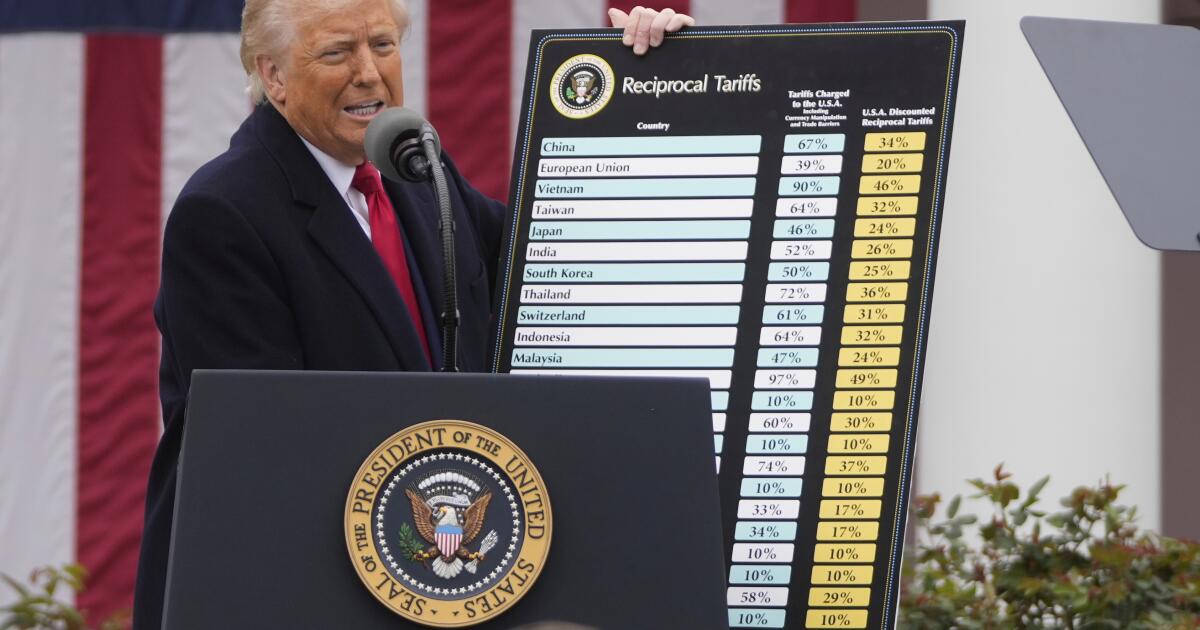WASHINGTON — A federal trade court on Wednesday blocked President Trump from imposing sweeping tariffs on imports under an emergency-powers law.
The ruling from a three-judge panel at the New York-based Court of International Trade came after several lawsuits arguing Trump has exceeded his authority, left U.S. trade policy dependent on his whims and unleashed economic chaos.
The White House did not immediately respond to a message seeking comment. The Trump administration is expected to appeal.
At least seven lawsuits are challenging the levies, the centerpiece of Trump’s trade policy.
Tariffs must typically be approved by Congress, but Trump has says he has the power to act because the country’s trade deficits amount to a national emergency. He imposed tariffs on most of the countries in the world at one point, sending markets reeling.
The plaintiffs argue that the 1977 International Emergency Economic Powers Act does not authorize the use of tariffs.
Even if it did, they say, the trade deficit does not meet the law’s requirement that an emergency be triggered only by an “unusual and extraordinary threat.” The U.S. has run a trade deficit with the rest of the world for 49 consecutive years.
Trump’s tendency to levy extremely high import taxes and then retreat has created what’s known as the “TACO” trade, an acronym coined by the Financial Times’ Robert Armstrong that stands for “Trump Always Chickens Out.” Markets generally sell off when Trump makes his tariff threats and then recover after he backs down.
Trump was visibly offended when asked about the phrase Wednesday and rejected the idea that he’s “chickening out,” saying that the reporter’s inquiry was “nasty.”
“You call that chickening out?” Trump said. “It’s called negotiation,” adding that he sets a “ridiculous high number and I go down a little bit, you know, a little bit” until the figure is more reasonable.
Trump defended his approach of jacking up tariff rates to 145% on Chinese goods, only to pull back to 30% for 90 days of negotiations. He similarly last week threatened to impose a 50% tax on goods from the European Union starting in June, only to delay the tariff hike until July 9 so that negotiations can occur while the baseline 10% tariff continues to be charged. Similar dramas have played out over autos, electronics and the universal tariffs that Trump announced on April 2 that were based in part on individual trade deficits with other countries.
Trump imposed tariffs on most of the countries in the world in an effort to reverse America’s massive and longstanding trade deficits. He earlier plastered levies on imports from Canada, China and Mexico to combat the illegal flow of immigrants and the synthetic opioids across the U.S. border.
His administration argues that courts approved then-President Richard Nixon’s emergency use of tariffs in 1971, and that only Congress, and not the courts, can determine the “political” question of whether the president’s rationale for declaring an emergency complies with the law.
Trump’s Liberation Day tariffs shook global financial markets and led many economists to downgrade the outlook for U.S. economic growth. So far, though, the tariffs appear to have had little impact on the world’s largest economy.
A lawsuit was filed by a group of small businesses, including a wine importer, V.O.S. Selections, whose owner has said the tariffs are having a major impact and his company may not survive.
A dozen states also filed suit, led by Oregon. “This ruling reaffirms that our laws matter, and that trade decisions can’t be made on the president’s whim,” Atty. Gen. Dan Rayfield said.
Whitehurst and Boak write for the Associated Press. A.P. writers Zeke Miller and Paul Wiseman contributed to this report.
